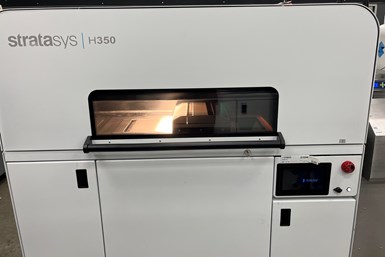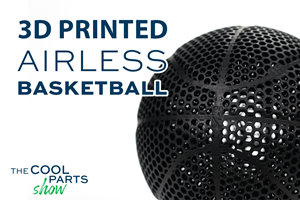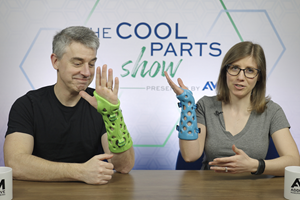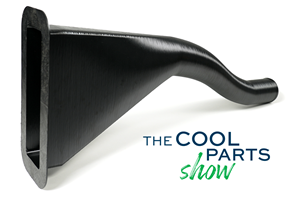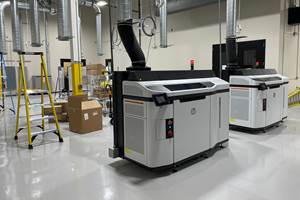Stratasys Terminates Merger Agreement With Desktop Metal
Stratasys is now exploring strategic alternatives to maximize shareholder value, while its board of directors is adopting a limited extension of the shareholder rights plan.
Stratasys’ most recent 3D printing technology, SAF enables quick means of mass production for end-use parts. Photo Credit: Additive Manufacturing
Stratasys, a provider of polymer 3D printing solutions, is terminating its merger agreement with Desktop Metal. It is now exploring strategic alternatives to maximize shareholder value, while its board of directors is adopting a limited extension of the shareholder rights plan.
This decision follows its announcement that, based on its preliminary count of votes cast at Stratasys’ Extraordinary General Meeting of Shareholders (EGM), the shareholders did not approve the terms of the previously announced merger agreement with Desktop Metal which was dated May 25, 2023. Accordingly, Stratasys has terminated the merger agreement. The final, certified voting results for the Stratasys EGM will be provided in a Form 6-K to be furnished to the U.S. Securities and Exchange Commission, which Stratasys expects to occur within four business days.
The company says the comprehensive process to maximize shareholder value will begin immediately. Potential strategic alternatives to be explored or evaluated may include but are not limited to a strategic transaction, potential merger, business combination or sale.
“We have decided to undertake a comprehensive and thorough review of all available strategic alternatives,” says Dov Ofer, Stratasys’ board of directors chairman. “We are entering this review as the leader in the additive manufacturing space and will continue to execute our strategy, powered by innovation and profitable growth, which has led Stratasys to outpace the competition. Importantly, we remain focused on our mission to deliver value to customers and are committed to taking the appropriate actions to maximize value for all Stratasys shareholders.”
The company says there can be no assurance that its strategic review process will result in any transaction or other strategic outcome. Stratasys does not intend to disclose further developments on this strategic review process unless and until it determines that such disclosure is appropriate or necessary.
Additionally, the Stratasys board of directors has unanimously adopted an amendment to Stratasys’ shareholder Rights Plan pursuant to which the expiration date of the Rights Plan was extended for three months. The Rights Plan is not intended to prevent or interfere with any action with respect to Stratasys that the board determines to be in the best interests of the company and its shareholders. Instead, it will support the board’s ability to carry out its strategic review process and position the board to fulfill its fiduciary duties on behalf of all shareholders by ensuring the board is able to evaluate all options to maximize shareholder value, and preserve for all shareholders the long-term value of the company in the event of a takeover or acquisition of a controlling stake without the payment of a control premium for all Stratasys ordinary shares.
Additional details about the Rights Plan extension will be included in a separate Form 6-K to be furnished by Stratasys to the SEC.
- Additive Manufacturing’s Fiona Lawler recently toured Stratasys’ Belton production facility in Texas. Read how it is growing to support its various 3D printing applications for mass production in industries such as automotive and aerospace.
- Learn about the Stratasys partnership with CollPlant Biotechnologies for industrial-scale bioprinting of tissues, organs. The joint development and commercialization agreement will initially focus on development of a bioprinting solution for CollPlant’s regenerative breast implants, addressing $2.6 billion market opportunity.
Related Content
Airless Basketball Shows Promise of 3D Printed Lattices: The Cool Parts Show Bonus
Successfully matching the performance of a standard basketball demonstrates the control possible over the mechanical properties of digital materials.
Read MoreActivArmor Casts and Splints Are Shifting to Point-of-Care 3D Printing
ActivArmor offers individualized, 3D printed casts and splints for various diagnoses. The company is in the process of shifting to point-of-care printing and aims to promote positive healing outcomes and improved hygienics with customized support devices.
Read MoreAircraft Ducts 3D Printed in Composite Instead of Metal: The Cool Parts Show #68
Eaton’s new reinforced PEKK, tailored to aircraft applications, provides a cheaper and faster way to make ducts compared to formed aluminum.
Read MoreWhat Does Additive Manufacturing Readiness Look Like?
The promise of distributed manufacturing is alluring, but to get there AM first needs to master scale production. GKN Additive’s Michigan facility illustrates what the journey might look like.
Read MoreRead Next
3D Printed Polymer EOAT Increases Safety of Cobots
Contract manufacturer Anubis 3D applies polymer 3D printing processes to manufacture cobot tooling that is lightweight, smooth and safer for human interaction.
Read MoreAlquist 3D Looks Toward a Carbon-Sequestering Future with 3D Printed Infrastructure
The Colorado startup aims to reduce the carbon footprint of new buildings, homes and city infrastructure with robotic 3D printing and a specialized geopolymer material.
Read MoreProfilometry-Based Indentation Plastometry (PIP) as an Alternative to Standard Tensile Testing
UK-based Plastometrex offers a benchtop testing device utilizing PIP to quickly and easily analyze the yield strength, tensile strength and uniform elongation of samples and even printed parts. The solution is particularly useful for additive manufacturing.
Read More




